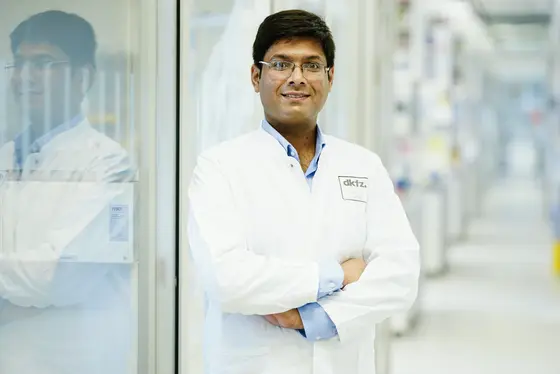Every year, in each of its six research areas, the Helmholtz Association honors young researchers who have completed their doctorate at a Helmholtz Center and obtained outstanding results. This year's prizewinner in the field of health, Mahak Singhal from the German Cancer Research Center (DKFZ), received the award for his research on how tumors spread.
Metastases – the spread of malignant solid tumors – are responsible for the large majority of deaths among cancer patients. Tumor cells use the blood and lymph vessels to spread through the body. In doing so, they come into close contact with the endothelial cells of the vessel walls and interfere with their control mechanisms.
At this interface between vascular biology and tumor biology, Mahak Singhal's research is geared toward gaining a better understanding of the mechanisms of metastasis formation in order to develop new diagnostic and therapeutic methods.
He was able to clarify the role that particular signaling and receptor molecules in endothelial cells play in the spread of tumors. He demonstrated in mice that antibodies against these control proteins can inhibit the formation of metastases in various tumors. In his most recent work, Singhal discovered that primary tumors systemically reprogram the endothelial cells to prepare the metastatic colonization. He managed to identify a protein responsible for this mechanism and to turn off its expression in a genetically modified mouse model. The animals subsequently developed fewer metastases.
A particular feature of Mahak Singhal's work is that he simulates the processes of metastasis formation in human tumors as faithfully as possible in preclinical systems. This has enabled him to identify new therapeutic target structures that are likely to be able to inhibit tumor metastasis more effectively in future.
Mahak Singhal studied biotechnology at the Indian Institute of Technology in Madras. He enrolled as a doctoral student at DKFZ's Helmholtz International Graduate School for Cancer Research in 2013 and carried out his doctoral project in the Division of Vascular Oncology and Metastasis (headed by Hellmut Augustin). He has been conducting postdoctoral research at DKFZ since 2019.
The winners receive prize money of EUR 5,000 along with payments of up to EUR 12,000 to cover travel and materials for a research stay abroad.
A portrait photo of the award winner is available for download:
www.dkfz.de/de/presse/pressemitteilungen/2021/bilder/singhal.jpg
Note on use of images related to press releases
Use is free of charge. The German Cancer Research Center (Deutsches Krebsforschungszentrum, DKFZ) permits one-time use in the context of reporting about the topic covered in the press release. Images have to be cited as follows: “Source: Anspach / DKFZ “.
Distribution of images to third parties is not permitted unless prior consent has been obtained from DKFZ's Press Office (phone: ++49-(0)6221 42 2854, E-mail: presse@dkfz.de). Any commercial use is prohibited.



